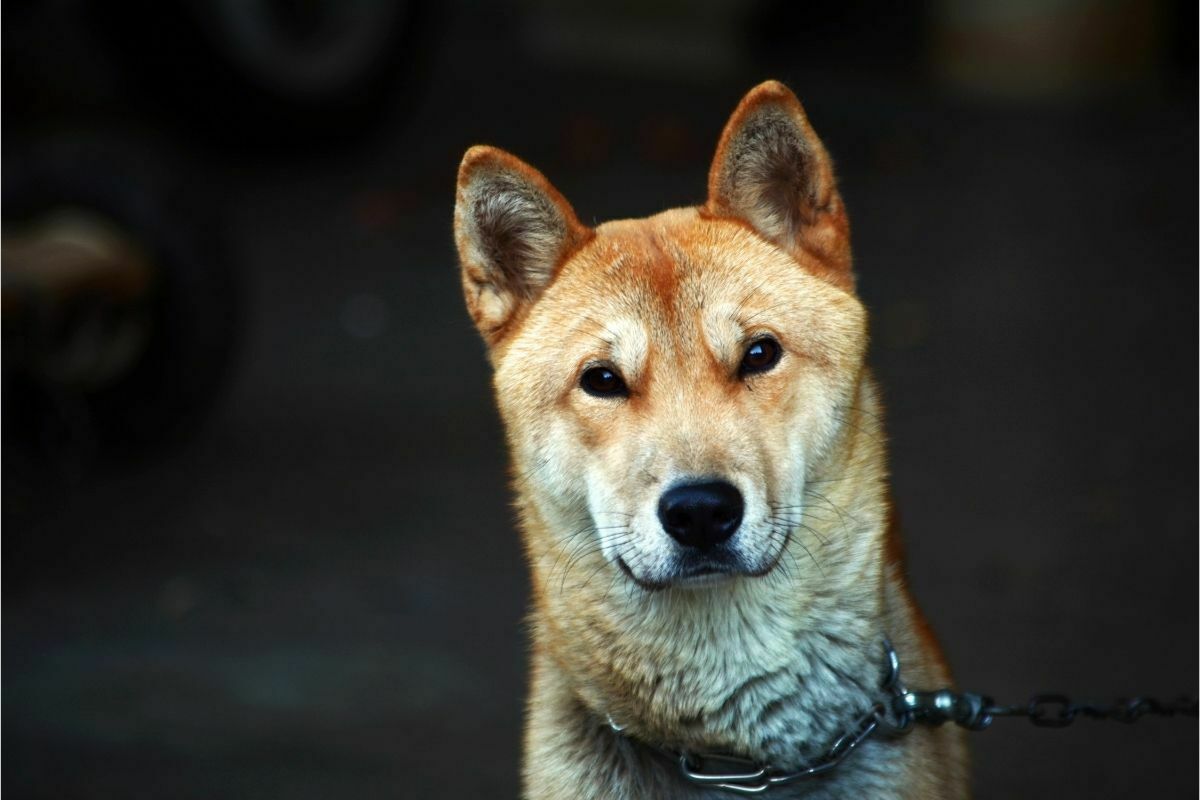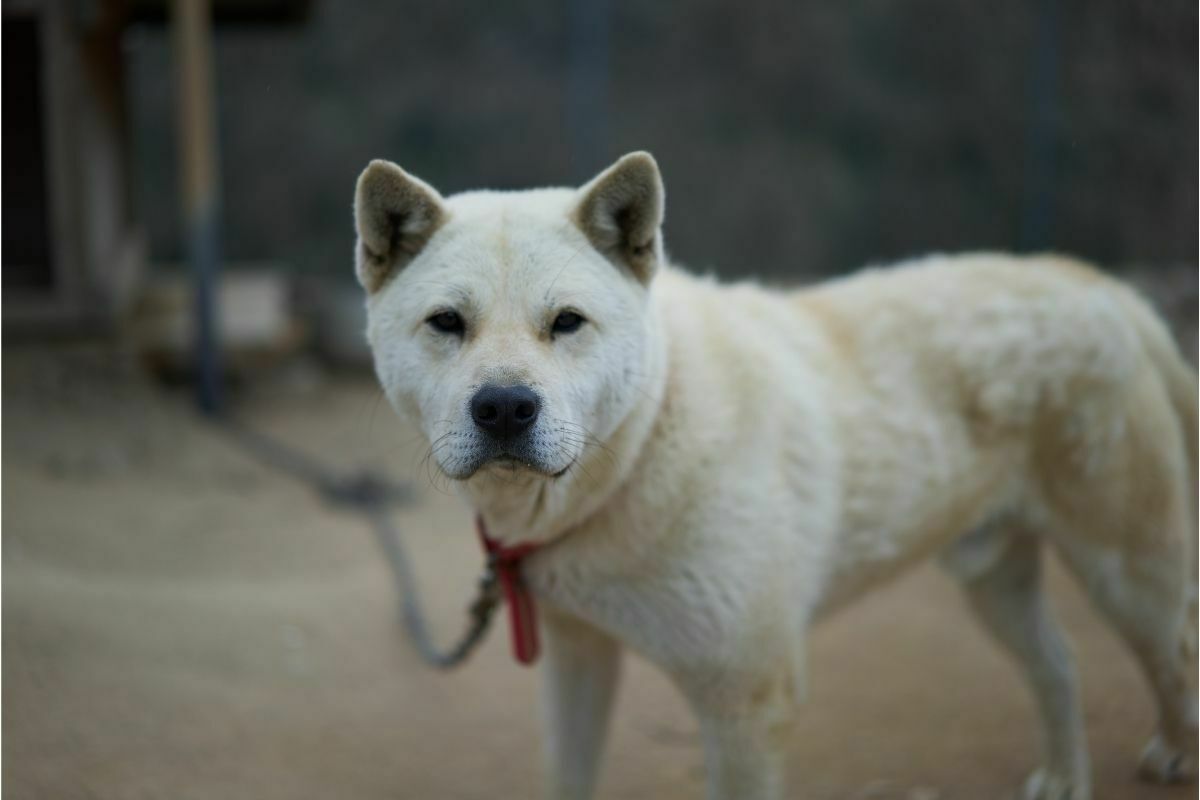The Korean Jindo is a wolflike breed of dog hailing from South Korea. It’s an ancient breed that has been around for over 2000 years and was originally used as hunting dogs.
The name “Jindo” comes from the word “Gin-do” which means “wolf” in Korean.
Much like other breeds of dogs like the American Eskimo Dog, Siberian Husky, and Akita, Korean Jindos are a Spitz breed.

They are very athletic-looking dogs, with erect ears and thick tails. Their short and dense coats make them look more like wolves than most other breeds of dogs.
Jindo dogs are extremely intelligent and can solve problems with a certain degree of ease. When compared with other breeds of dogs, they can learn new commands in a shorter space of time.
They’re also highly independent. This independence coupled with their high intelligence means that they can make decisions on their own without necessarily needing direction from their owners.
Jindo dogs make great companions as they are fiercely loyal to their owners, this also makes them safe around children. They are very protective, but this tends to be reserved for one person or family.
That being said, it is well documented that a well-socialized Jindo should take to someone that is accepted by their owner.
This breed of dog can be found all throughout Asia, but it is most commonly seen in South Korea.
What Do We Mean By Hypoallergenic?
The term hypoallergenic can be quite confusing. It’s often used to describe an animal that is completely safe to own if you have allergies. The truth is that no animal is truly hypoallergenic, as all animals with fur shed it.
However, some animals are less likely to cause allergic reactions than others. This is because they don’t shed their hair or skin as frequently or as intensely as other animals do.
Some examples include cats, rabbits, guinea pigs, ferrets, hamsters, gerbils, chinchillas, and even fish!
There are a few different allergens produced by all animals, the most common of these being fur and dander.
Whilst many people suffer from allergies associated with fur, dander is typically overlooked as a cause of allergies, when in fact it is usually the cause of these allergies.
Dander is dead skin cells and is shed by all animals, including Jindos. Dander is not just found on the head, but also on the feet, legs, tail, chest, stomach, back, shoulders, and face.
As mentioned before, Jindos tend to shed their coats much less than other breeds of dogs. This means that they produce far less dander than other breeds of dog, especially those that have longer hair coats.
How Does A Jindo Compare To Other Dogs In Terms Of Allergies?
There isn’t any scientific research available on how much a Jindo will trigger your allergies compared to other types of dogs. However, there are some things we know about this particular breed of dog:
- They tend to shed less than many other breeds of dogs.
- They also tend to be less aggressive than other breeds of dogs.
- Furthermore, they are not known to be prone to certain diseases such as hip dysplasia.
If you’re concerned about having an allergy problem, then it might make sense to consider getting a Jindo instead of another type of dog.
If you already have a pet, then it would probably be best to get one that sheds less than your current dog, to reduce the amount of fur and dander in your house.
Do Jindos Require Much Care?

In terms of exercise, Jindos do need to be kept as active as possible. As they are an athletic breed, they need a reasonable amount of physical activity and as such are not suitable for novice or new dog owners.
It would be worth taking your Jindo to a few training classes in order to establish a strong bond with them, but also to ensure that they are well socialized.
Jindos are guard dogs by nature, so they naturally react to anything unusual or out of place in their environment.
This is why it’s so important to socialize them as puppies, in order to broaden their concept of what is normal in the world.
Jindos produce very little body odor, and in fact will often clean themselves, much like cats do. They do require weekly brushing to reduce shedding, along with an occasional bath.
Jindos will ‘blow’ their coat twice a year, meaning that their undercoat will come out in a relatively short period of time. This is perfectly normal for Jindos.
In this time, they’ll shed continuously, so daily brushing becomes essential.
The only thing that should concern you if you decide to get a Jindo is whether they will be able to fit into your lifestyle.
In Conclusion
The Jindo is a relatively small dog, which makes them perfect for apartment dwellers who don’t want to give up space. Their compact size also makes them ideal for families with children, as they can easily fit into smaller spaces.
However, if you’re looking for a larger-sized dog, then you may find yourself disappointed. Jindo tends to be more of a lapdog rather than a family dog.
This doesn’t mean that they aren’t great companions, though!
If you’re looking for a dog that requires minimal care, then the Jindo is definitely the right choice for you.
However, if you need something that’s going to provide a lot of love and attention from day 1, then perhaps you should look elsewhere.
Overall, Jindo is a wonderful companion dog. They’re easy to train, friendly, intelligent, and affectionate.
They’re also fun-loving and energetic, making them excellent for people who enjoy spending quality time outdoors.
